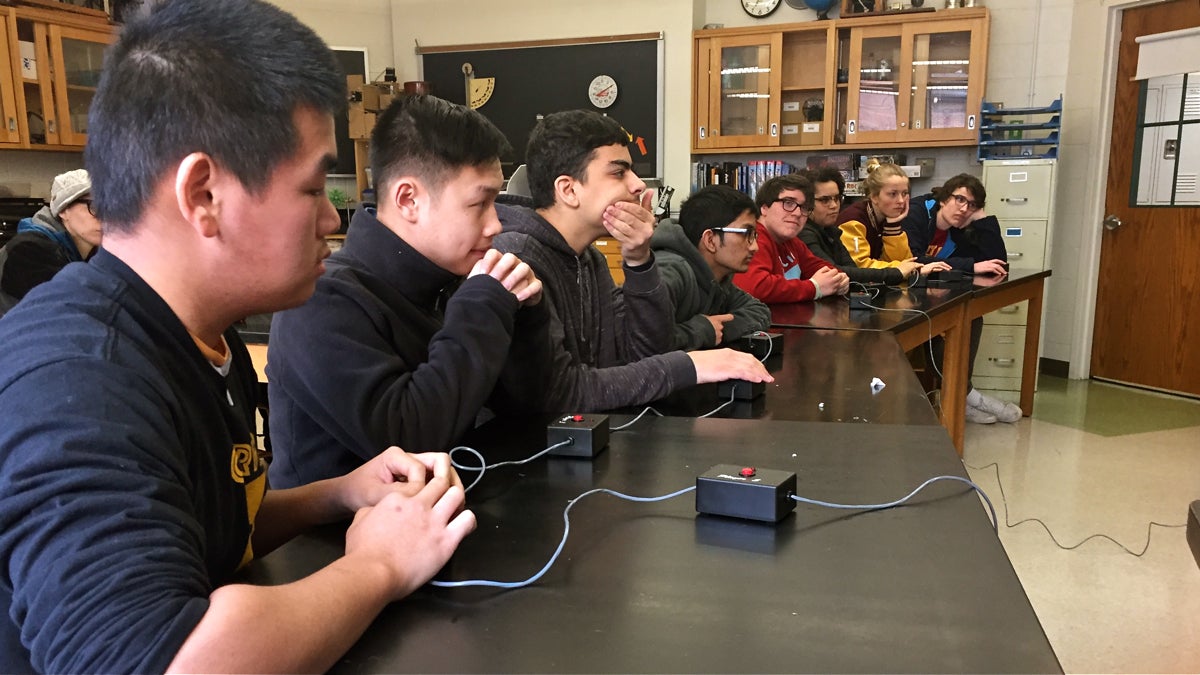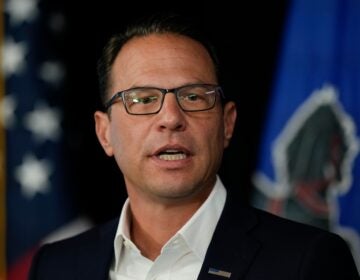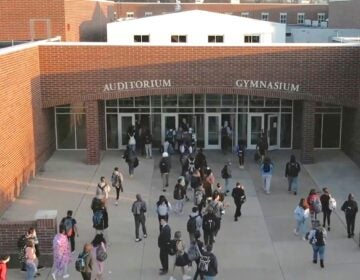A ‘David versus Goliath’ showdown creates drama at Philadelphia’s Quizbowl
Listen
From left to right, William Zhang, Su Ly, Hasan Taloui, and Mohammed Imon of the Carver HS Quizbowl team play against Central HS at the city's Quizbowl championship. (Avi Wolfman-Arent/WHYY)
The story of a high school in North Philadelphia as it tries to topple the city’s trivia Goliath.
David versus Goliath. It’s a theme that comes up a lot this time of year. Usually it’s accompanied by screaming fans and blaring bands.
But on a recent Saturday at Friend Select quaker school in Center City, David wasn’t holding a slingshot or a basketball. Instead he was fiddling around with a Rubik’s Cube.
William Zhang, a senior at Carver High School of Engineering and Science in North Philadelphia, has an active mind. That’s why he’s memorized the capitals of Africa. That’s why he fills idle minutes by timing himself as he solves Rubik’s Cube combinations. And that’s why he stars on Carver’s Quizbowl team.
Quizbowl is an academic competition that pits school against school in a battle for trivia supremacy. It’s existed since 1996, but had almost no footprint in Philadelphia until a Penn PhD student–and part-time Quizbowl evangelist–named Chris Chiego started encouraging schools to establish teams about two years ago.
Last year Chiego helped organize the first ever city championship. Twelve teams from five schools showed up. On Saturday the second rumble for city supremacy featured 18 teams from ten different schools.
One of those school was Carver, a science and math magnet located near Temple University. Before the competition started I approached Carver’s team somewhat by chance. I needed someone to explain how Quizbowl worked and it seemed logical to approach the only team using flashcards to cram for the day’s competition.
Zhang and his teammates graciously explained the rules. They go something like this:
Teams of four compete in a quiz competition that combines speed with knowledge. Each round begins with a toss-up question that get progressively easier as it’s asked. Whichever player buzzes in first gets to guess the answer on his or her team’s behalf. If he or she gets the question right his or her team receives points and then gets exclusive access to a trio of bonus questions. If he or she is wrong, his or her team loses points. There are 20 rounds before final scores are tallied.
Or in other words: A bunch of really smart kids answer a bunch of really hard questions. Over and over again.
The Carver team told me that the prohibitive favorite at this year’s tournament was Friends Select, which was fielding four different teams. But they also told me with a sort of sarcastic confidence endemic to the highly intelligent that they were the second-best team. And if anyone was going to topple the mighty quartet of Friends Select squads, it was them.
“No mercy to anyone,” Zhang said in his half-joking rendition of a battlefield cry “Yeah, we’re trying to win this thing.”
Intrigued and amused I followed Carver to its first match-up and realized quickly the Carver kids weren’t kidding.
Quizbowl is a blur of buzzers and big words. And Carver was like a trivia tornado blowing through each team in their path.
A typical toss-up question would begin with some obscure geographical reference or arcane scientific term. Within seconds the questioner would be preempted by the chime of a Carver player buzzing in and offering an answer that would have passed for mind-blowing if it didn’t happen so regularly.
Carver is a selective magnet school, but even against other magnet schools they stood out. First they took down Central High School. Then they blew past Masterman. The top schools in the city were no match for the Carver quartet.
During each round, Carver coach Shan Hogan sat a few feet behind her team scribbling notes and keeping score. Hogan is a Quizbowl fanatic. Years ago she’d played on a high school team in State College, Pennsylvania that various people throughout the day described to me as “legendary.”
She started the Quizbowl team at Carver in 2013 before there were any competitions in Philly. They played exclusively against themselves until Chiego endeavored to start a citywide league in 2015.
“I like to call us the lovable band of misfits,” Hogan said. “We are the nerds that sometimes don’t even fit with the other nerds.”
Perhaps the connection was only symbolic, but Hogan saw a cosmic overlap between the skills Quizbowl privileged and the people who ended up playing it.
“I do think sometimes we get the people who have this knowledge in their head and it might be obscure and random and it might fit in nowhere else,” she said. “But it fits in with us and that’s sort of the people that end up finding us.”
In the morning round-robin tournament Carver won all five of its games to earn a place in the championship competition later that afternoon. During lunch, organizers announced that no individual player had scored as many points as Zhang.
Carver had always been a good team in the past, but never this good. Slowly the semi-sarcastic rally cries morphed into something more earnest. Carver had a shot.
As the day wore on I also learned bits and pieces about the members of the Carver team. William Zhang’s parents used to run a restaurant in South Philadelphia. North Philadelphia’s Su Ly immigrated from Cambodia when he was young. He’d recently earned early admission to Penn. Hasan Talouli’s parents fled Palestine when they were young. Later they moved from Jordan to the U.S., where they’d opened a daycare in Northeast Philadelphia. Mohamed Imon lived in West Philly with his mom and sister. They arrived from Bangladesh about five years ago, when Imon was 10
Imon was the team’s ace on sports trivia, a subject he’d mastered thanks to his grandfather’s obsession with Philadelphia’s four professional sports teams.
“He used to have a radio right next to him,” Imon said. “And at night you’d hear the Phillies games.”
They were each from a different part of the city and the world. Together they seemed to know everything.
But to win the competition they’d need to beat all four teams from Friends Select in ascending order, starting with the school’s “D” squad.
The difficulty of that became apparent immediately as Friends Select “D” jumped out to an early lead. Carver, though, would battle back for a victory, which it followed up with a dramatic win over Friends Select “C.”
After a startlingly easy romp over the Friends Select “B” squad, the championship was set. Carver and Friends Select “A,” both undefeated, would clash in a three-game series to decide the victor.
Before the match started, Hogan gathered her team for a final huddle.
“”If there’s a day to beat them, today is that day,” she said.
“Yeah, today is that day,” Zhang repeated, his tone now totally sincere.
“Today is our day,” Hogan replied.
Friends Select is one of the oldest and most prestigious schools in Philadelphia. Carver’s team, meanwhile, held bake sales just to cover the cost of getting to and from tournaments.
The Friends Select kids seemed perfectly nice and may well have overcome their own obstacles. But it was hard to deny the whiff of a Hollywood ending: an underfunded public school up against a private school juggernaut.
Could David pull it off?
Short answer, no. They couldn’t.
As good as Carver had been all day, Friends Select was that much better. That much quicker. That much sharper.
Despite some occasional friskiness from the Carver squad, Friends Select stormed to two consecutive victories and the city crown.
Of course teenagers can be remarkably resilient. By the time the trophies were handed out, the Carver team was dabbing and joking and making nerdy inside jokes with their coach about French novelists.
Perhaps the kids had learned something–about teamwork or hard work or whatever. Because if the competition was any indication, they already knew everything else.
WHYY is your source for fact-based, in-depth journalism and information. As a nonprofit organization, we rely on financial support from readers like you. Please give today.





